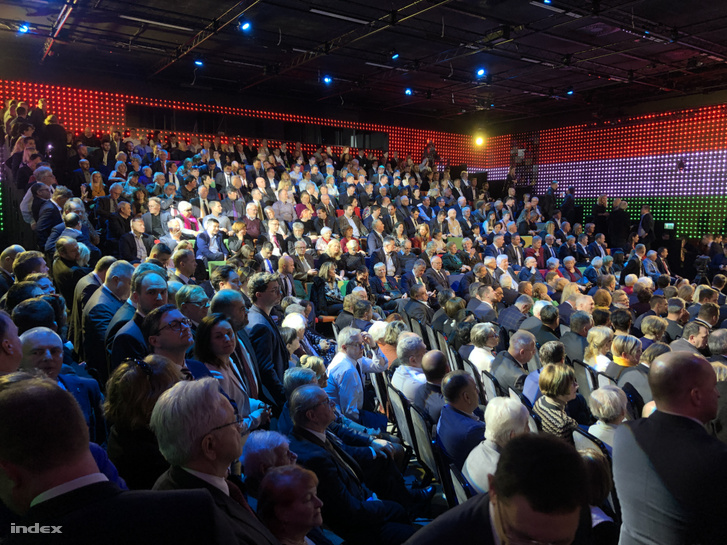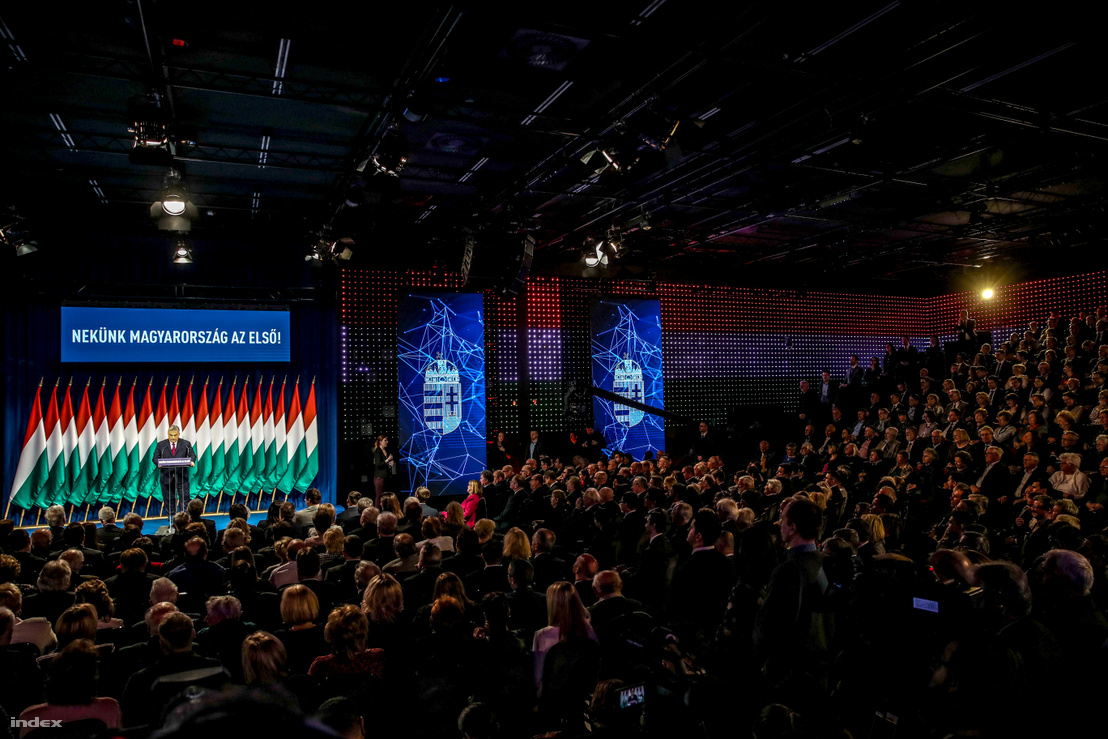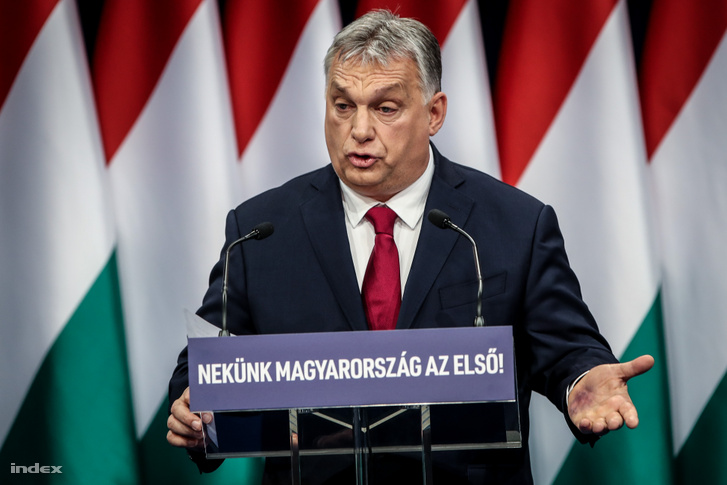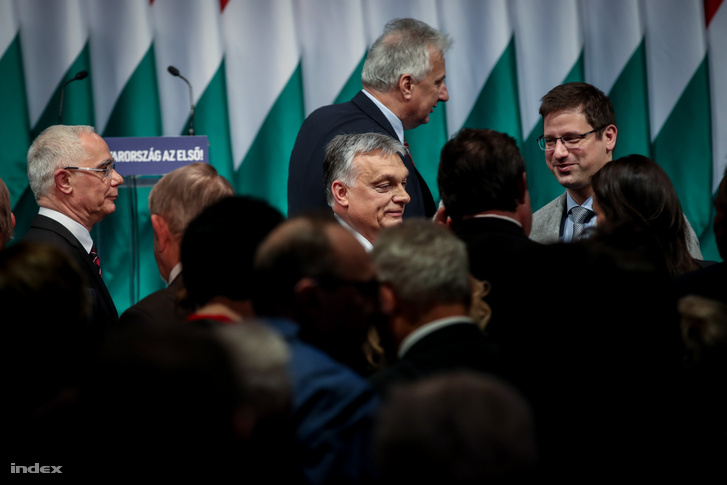Orbán: 'There are no liberals, only communists with university degrees'

It was the 22nd time on Sunday that Hungarian Prime Minister Viktor Orbán held his annual State of the Nation Address in Budapest, and it was the tenth in a row with him in office. Given the special occasion, Orbán did not only evaluate the past year as he usually does but assessed the previous ten years as well, concluding that they were Hungary's best decade in the hundred years since the Treaty of Trianon.
Apart from commending the achievements of his own government and explaining how the language of "liberal Euro-gibberish" is incapable of expressing them, Orbán talked about his new national consultation at length that takes aim at the compensations paid to Roma students who suffered school segregation and the lawsuits started by inmates because of inhumane prison conditions. They are, according to Orbán, all parts of George Soros's master plan, and the government needs the people's support to fight them.
As far as policies go, the only major announcement of the afternoon was that the government is introducing the Climate Protection Plan, a collection of seven green measures, though several elements, such as increasing solar capacities, reforestation, the "green bonds," and others were already announced before, even if not so much in the limelight. Orbán also evaluated last year's Family Protection Plan - the population is still decreasing, but there is an intention to expand the program, though it's only an intention still, as it is unsure if there is money available for it.
Orbán's acknowledgement of climate change as a serious issue could also show that Fidesz's internal critics may have gotten their message through to the PM, and this is further evidenced by him talking about the party's difficulty in addressing the youth - a new generation grew up without experiencing "what went down before 2010," Orbán said, adding "those who never saw a bear may not be afraid of them, but it's good to remind them that bears are still not toys."
Internal criticism resurfaces in Fidesz
After missing in action for at least a decade, critical voices reemerge in Fidesz as the Hungarian governing party is trying to piece together what went wrong in the 2019 municipal elections.
The Prime Minister noted that after two years of frantic campaigning, 2020 and 2021 will be about governing as the 2022 general election is still far away. Still, Orbán thinks that in order to win that, Fidesz has to learn how to "fly like a butterfly" even if they are already proficient at stinging like a bee. Here is our detailed read-out of Orbán's 22nd State of the Nation Address, with a summary of opposition responses below:
100 years of the Treaty of Trianon...
Orbán started his speech by remembering the upcoming 100th anniversary of the Treaty of Trianon, commenting that the dictate that closed a chapter of Hungarian history hacked two-thirds of the country's area off with every third Hungarian ending up on the other side of the border.
"No nation survived blood loss of that magnitude, and the decisionmakers at the time knew this."
Orbán said that an even greater problem at hand was that state formations such as Czechslovakia, Yugoslavia, and the Soviet Union emerged around Hungary, forcing the country to "curl up" and accommodate itself for survival, waiting for these formations to weaken and ultimately, crumble. "They did dig our nation's grave," Orbán paraphrased the words of Versailles peace talks delegation leader Albert Apponyi, adding he was right; "we did attend their funerals," as those three states fell apart while Hungary still exists. Orbán said that after these "formations" reorganized themselves into nation-states, Hungary found a way to forge friendships and alliances with them "to defend ourselves against threats from the East and the West."

... and 10 years of Orbán
Viktor Orbán noted that there is another anniversary in 2020 as well: It's been ten years since "the socialist nightmare-governance was ended by the people" as "hope and desperation added up" when the country was nearing bankruptcy and IMF's respiratory machines kept the country alive - how to get out of such a spiral, Orbán asked, only to answer: "It's important to convince people not to give up, to act, to use their energy reserves, that is the secret to handling a crisis," adding that for a nation to emerge, their confidence has to be restored, "think of Trump's America or the success of Boris Johnson," concluding that Hungary has proven to its people and to the world that it still matters:
"For us, the paths drawn by Brussels and Washington were untraversable, so we had to forge our own."
Orbán lauded his government's economic policies at length, noting that for ten years, Europe has debated how to evaluate the Hungarian social and economic model, calling it many things: post-liberal, illiberal, Christian democratic, democratorship, hybrid regime - but according to Orbán, the confusion is justified as "there is no such creature anywhere else," maybe with the exception of Poland.
"They cannot accept the fact that on this part of the world, we can define our liberties without any liberal smart talk, based on three Christian principles: We have the ability to differentiate between good and evil, God has created us all in his image, therefore, we are all equal regardless of our ancestry and skin colour, and Christianity teaches that we should treat others the way we want to be treated."
Orbán said that the "liberal Euro-gibberish" is incapable of expressing what happened in Hungary, how it shook off IMF loans choosing tax cuts instead of austerity measures, patriotic economy instead of globalist business, Hungarian babies instead of migrants. The PM said their loudest critics were the ones who "almost bankrupted the country before 2010," the ex-communists pushing liberal policies. "There are no liberals, only communists with university degrees," Orbán quipped, much to the satisfaction of the audience. "If we took their advice," he continued, "Hungary would be on life support with loans from the IMF and Brussels, and George Soros would have his hand on the money taps," but the PM warned that Soros is still on the loose:
"Do not forget: The Soros-plan, the systematic settling of foreign people, is still on the agenda, the operation is still ongoing, and we still have to protect ourselves."

A new National Consultation
According to Orbán, the secret to Fidesz's success is "governing with the people" through the eight national consultations held in the past ten years, referring to the biased surveys the government sends out to all voting-age citizens supported by generous amounts of government propaganda. As Chief of Staff Gergely Gulyás already announced it on Thursday, the new consultation will focus on topics Orbán already defined at his single annual press conference in January as "things that hurt the Hungarians' sense of justice." Orbán said that they need to create "talking points on which everyone agrees" to enable the government to defend their positions on these matters, starting with:
"In Europe, decisionmakers think that the rights of violent criminals are more valuable than the rights of law-abiding people."
Here, Orbán was talking about the lawsuits Hungary had lost to former inmates who sued the state for inhumane prison conditions, as prison overcrowding is a serious issue in Hungary - see our video on the topic with English subtitles here. Orbán said this "dangerous phenomenon" already rampant in the West was brought upon Hungary by "foreign-funded organisations that are parts of the Soros-network" who abuse human rights protection by hiring lawyers to start thousands of lawsuits.
Similarly, he brought up the case of the Gyöngyöspata school segregation - according to Orbán, the court decision awarding damages to Roma people who suffered segregation had "upset the balance of Gyöngyöspata" just when Roma families "started taking the path towards change, taking part in public works programs, raising children properly, living on wages instead of handouts." He said the government is committed to ending poverty in Hungary, which includes ending poverty for Roma families as well, but this trend was"interrupted by the court" when it "turned the Roma and non-Roma people of Gyöngyöspata against each other" - according to Orbán, this was also financed by George Soros, "there are no coincidences," he said, adding:
Orbán: Compensating Romas for school segregation is "unjust" for the rest of the community
Romas of a small north Hungarian town are to recieve compensation for suffering school segregation, the Prime Minister says the decision is unjust.
"One's heritage should never lead to disadvantages, but it should never lead to advantages either."
Don't scream 'golden age' just yet
After some reluctance and titillation, Orbán admitted that his decade of governance was Hungary's most successful ten years in the past century, adding that this performance is the merit of the people, but the responsibility of the government. Hungarians are famously bad at talking about success, he said, but an American president would loudly and proudly exclaim what he only dares to say quietly. He said Hungary is on the list of the top 35 countries with the highest export while external debt did not increase and wealth inequalities remained within tolerable levels in European comparison.
Over past ten years, Orbán proclaimed, Hungary learned that no nation can be confident without a strong and modern army that is capable of defending the country. Orbán added that the army needs to be appreciated, and they should be present at more civilian and government events, so they could "take the place in Hungarian social life they deserve."
The other thing Hungary learned according to Orbán is geographical: Europe is not in Brussels, "we are Europe," and Hungary does not have to meet the expectations of the "tired Brussels elites" - Europe is not Hungary's future, Hungary is the future of Europe.
"Being scolded by Brussels bureaucrats is not the end of the world, once you see that you can take it. (...) We no longer believe the liberal fairytales about self-regulatory markets, good capitalism, the EU and a nice globalised world order, we live by our own rules. Our nation knows that Hungary is first, and those disputing that should tell what else they think should be first - there is no rational answer to that, so let's agree to put Hungary first."
This looks quite good, Orbán assessed, "so it's understandable if some already want to scream that this is a golden age," but that would be premature since the EU's economy is slowing down and climate change is creeping up on Europe, and though there is an agreement within the EU about achieving carbon-neutrality by 2050,
"2050 is still quite far away and no politician has ever been so poor that they could not afford to make promises."

Hungary's Climate Protection Plan
Orbán said that it is time to act instead of talking about climate change. "When children are pitted against climate change, I think that is crazy. Who are we saving the planet for, if we have no children? Protecting the climate and our environment is our patriotic and Christian duty." With that in mind, he introduced the seven-step climate protection plan that seemed more like a repackaging of measures the government already spoke about before:
- Stopping illegal waste disposal, fining polluters,
- Banning single-use plastics,
- Protecting rivers from foreign pollution,
- Strict policies against multinationals forcing them to use eco-friendly technologies,
- 32 billion Forints for small and medium-sized enterprises to incentivise renewable energy sources,
- Achieving 27% forest coverage until 2030 by planting ten new trees for each newborn.
- Increasing solar capacity by 500% in the coming years,
- Subsidizing cheap electric car purchases, and only allowing cities to purchase buses that are electric from 2022,
- Introduction of "green state bonds."
How did the family protection plan go?
A year ago Orbán announced a different protection plan, that time for families. "Let's be modern and sexy," he enticed before boasting that "baby expecting loan" was the 10th most popular search term amongst Hungarians in 2019 according to Google Analytics. He noted that family car subsidies were also popular, kindergartens are being built, 40 000 mothers of four are now exempt from income tax, and Hungary nationalised fertility clinics in order to make them free for anybody who needs them.
Orbán's Family Protection Plan - could it work?
Could the government solve Hungary's demographic troubles by throwing money at the problem?
But even Orbán admitted that the Family Protection Plan did not stop the decrease of the population, financial reasons still stop people from having children.
"If we want real change, we have to cross the Rubicon: We have to build a country where having children is worth it more than not having children."
The Prime Minister said that the government already knows how to achieve this, but it is unsure if the necessary amount of money would be available - Orbán wants to extend the income tax exemption to mothers of three as well, and said mothers of newborn children should get 100% of their earlier wages after childbirth instead of just 70%, "but for now, these are only intentions."
Economic troubles on the horizon, elections still far away
Orbán warned that the growth of the Eurozone is slowing down, "and though we could say that is their problem," 85% of Hungarian exports go to these countries, so their problems are Hungary's problems, the question according to Orbán is, to what extent?
The challenge, according to Orbán, is to keep the Hungarian economy on a growing trend while the European Union's economy stagnates. Orbán opined that while other world powers, such as the USA, have realised that competition never ends, Europe seems to believe so as the EU limits competition in jobs, services, and trade. "Sometimes I feel like the West did not learn from our history, and they don't know that socialism destroys nations," he said, arguing that European nations have to compete against each other to be on their best paths. "If we are regulated into the economy of the United States of Europe, we will stagnate," which is why Hungary has to be careful about the introduction of the Euro, "let's not sit on a train with an unknown destination."
Orbán noted that Hungary had three successive elections in the past two years (general, European, and municipal elections), and "with the campaigns over, it is time to govern." As for what to expect in 2022, Orbán quoted one of his "favourite political advisors," Muhammed Ali: Fly like a butterfly, sting like a bee. He added that though Fidesz still needs to practice flying, they are quite adept at stinging already. With regards to the opposition alliance that had considerable success at the municipal elections, Orbán merely remarked that their jersey is rather strange with "arrow-cross shorts, communist shirts, and rainbow-coloured pins."

The opposition's response
Though pro-government political daily Magyar Nemzet reported last week that Viktor Orbán will (traditionally) attend the first meeting of the Parliament's spring session, he was a no-show, so parties in Parliament could not personally respond to the Prime Minister's words - according to his press officer, the most important concern for Hungary now is the new coronavirus, and the best person to inform the Parliament about that was Miklós Kásler, the Minister of Human Capacities. With that said, most opposition parties issued press releases on Sunday responding to the Prime Minister's speech, here are their main points:
- Democratic Coalition (DK), the left-wing party led by former PM Ferenc Gyurcsány responded that Orbán did not write history but a horror novel while the country was never as divided as it is now. "The economic growth of a Hungary that operates as an assembly line is worth nothing if the government serves the interests of a narrow political-economical elite instead of the public good," while the school system and healthcare are crumbling, and the measures of the Family Protection Plan are not working, DK wrote, adding that "Hungary lost its friends in the European community, from a respected democrat, the Hungarian Premier turned into an embarrassing troublemaker."
- Párbeszéd, the party of Budapest mayor Gergely Karácsony opined that Orbán's speech was mostly about how "the one thing about himself he adores is his modesty," but Párbeszéd thinks there is only "emptiness, shame, and failure hiding behind the government's rhetorics that incite hatred against migrants, communists, Soros, the EU, the judiciary, and the Roma people," and the PM never spoke about solutions for the crises in healthcare, education, and housing. Párbeszéd also criticised the government's response to climate change, saying that the proposed solutions show they do not even understand the problem, and they also reminded that Fidesz voted against the ban on single-use plastics in the European Parliament. Párbeszéd denounced Orbán's new National Consultation because they see it as another tool to incite hatred and distract the public from more pressing issues.
- Erzsébet Schmuck, co-chair of green party Lehet Más a Politika (LMP) told journalists at a press conference after Orbán's speech that the newly announced green measures are belated and out of sync with the current challenges. She proposed the creation of a Ministry of Climate and Sustainability and the allocation of state funds for the cause. Schmuck said that in the past ten years, Orbán's governments demolished the institutions of environmental protection and "set nuclear energy in stone," disregarding renewables. János Kendernay, another co-chair of LMP added that Viktor Orbán "lives in a fairytale" if he does not see that Hungary's recent economic growth was fueled by EU funds and money sent home by Hungarians working abroad.
- Jobbik's press release reads: "Orbán would gladly solve all troubles of the world, and now that includes climate change too, provided Lőrinc Mészáros gets to spend the money put aside for it." The formerly far-right party says that Viktor Orbán let go of the hands of workers and pensioners, and he does not know how to get money to Hungarian families before the impending economic crisis - "though it's simple: they should stop stealing," and if that would not be enough, the government should spend the "hundreds of billions of Forints" they would spend on the hate-mongering national consultation on raising wages and pensions instead.
- Mi Hazánk, a far-right party that split from Jobbik says government policy is not brave enough, arguing that the Hungarians are the real victims of the Gyöngyöspata segregation - they want Hungary to "withdraw from the jurisdiction of the court in Strasbourg" to end the "prison-business," and they urged the government to take tough steps to protect the rights of Hungarians across the border, calling the Parliament to declare the Trianon treaty invalid.

Support the independent media!
The English section of Index is financed from donations.





